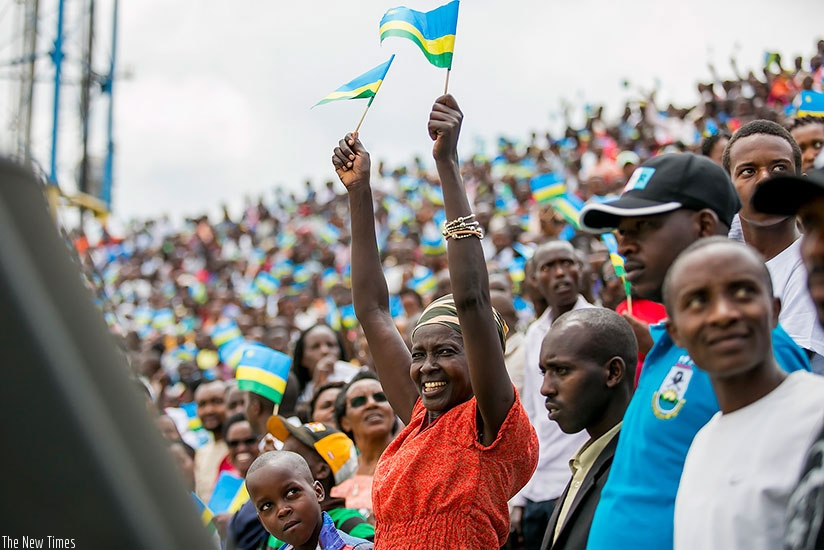The lawmakers were generally in agreement that the Government had done exceptionally well over the years but shared different views on areas they thought need special attention to accelerate economic development and urgently improve people’s welfare.


The lawmakers were generally in agreement that the Government had done exceptionally well over the years but shared different views on areas they thought need special attention to accelerate economic development and urgently improve people’s welfare.
President Paul Kagame’s inauguration on Friday paved the way for the formation of the next government. The law requires the Head of State to pick his next cabinet within 30 days from the day of the Presidential Oath.
With the country inching ever so closer to its Vision 2020 targets, efforts are already underway to develop another comprehensive economic blueprint to help accelerate national development in the medium- and long-term.
The Government has said it is laying the groundwork for what has been dubbed Vision 2050, while it has also undertaken efforts to domesticate Sustainable Development Goals (set to be achieved by 2030).
The New Times yesterday spoke to various parliamentarians on what they think should be done to fast-track the country’s development in the coming years.
The lawmakers were generally in agreement that the Government had done exceptionally well over the years but shared different views on areas they thought need special attention to accelerate economic development and urgently improve people’s welfare.
Northern Province’s women representative Fortunee Nyiramadirida said there is need to sustain interventions that address the specific needs of women, youth and the poor, as well as put more emphasis on service delivery.
"A lot of progress has been made on the service delivery front, but there is still a problem that needs fixing, especially in government institutions. Grassroots leaders at the cell and sector level, in particular, can do much better,” she said.
"Local leaders need to be closer to the people and to address their issues; it should not be senior government leaders to go down there and address these problems.”
RPF’s Theobald Mporanyi said the Government has over the years laid a concrete foundation upon which future development efforts would be based.
"We started off from a state of emergency, and then we resettled the people, fostered unity and promoted justice. We then started the development phase and today we have good roads countrywide, while the number of people with access to water and electricity has significantly increased. We have also promoted peace and stability…all this gives us a solid foundation to make more gains in the coming years,” he said.
Mporanyi said the next major task is about creating jobs and "changing the attitude of our people towards jobs.”
"What do we need to create jobs? Quality education, that’s number one. Secondly, changing our young people’s attitude towards work.”
"I went to Ghana and saw university graduates running a lucrative shoe-shining business,” he said.
"Not everyone is going to get an office job, we need to encourage our young people to keep an open mind on the labour market.”
Unemployment among university graduates stood at 13.5 per cent in 2014, according to National Institute of Statistics of Rwanda’s 2013/14 Integrated Household Living Conditions Survey (EICV4).
Efforts to curb unemployment
However, Government has since stepped up efforts to reverse the trend, including rolling out a programme that enrolls fresh university graduates for short-term Technical and Vocational Education and Training (TVET) courses, with some graduates already repeating the fruits.
Mporanyi said Rwandan youth should also look beyond national borders to tap into the benefits that come with regional integration.
Liberal Party (PL)’s Francois Byabarumwanzi said all the interventions should be able to bring about improvement in the quality of life of the citizens.
The government runs social safety net programmes that directly impact the lives of the most vulnerable through such flagship projects such as Girinka (under which more than 350,000 cows have been given out to vulnerable households over the last decade) and Vision 2020 Umurenge Programme (VUP) which seeks to eradicate extreme poverty with Rwf25 billion having been spent on hundreds of thousands of poor households to date.
Byabarumwanzi said more efforts need to be made to lift people out of poverty. "Development initiatives should be assessed based on how they have impacted citizens at the lowest level.”
"I need to look at citizens at the grassroots and see a significant change in their everyday life. If that is fixed, then we can take it from there because it’s like a cycle.
"Yes, roads should be constructed but also everyone should have medical insurance cover, and all of the children should be in school and they should be eating and looking healthy,” he said.
Though the number of people living in poverty dropped from 45 per cent in 2010 to 39 per cent in 2014, the number of vulnerable people remains high – at 85,899. RPF’s John Ruku-Rwabyoma said the next Government will need to stay the course as far as development is concerned or even double efforts where possible.
He urged his colleagues in Parliament to play their part, with specific attention to their oversight role and accountability.
"Enforcement of accountability where state finances are concerned is our responsibility. We have the Auditor General who is doing a good job in pointing out things that are not going well…it’s our role to help bring about utmost accountability in public institutions,” Ruku-Rwabyoma said.
editorial@newtimes.co.rw


